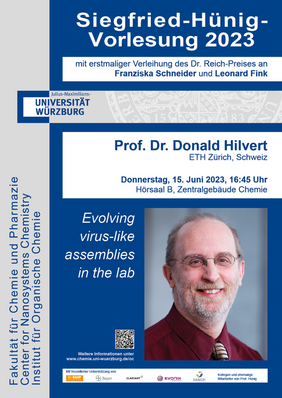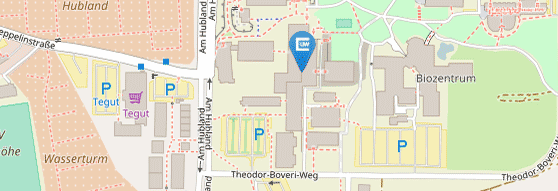Prof. D. Hilvert: Evolving virus-like assemblies in the lab
Evolving virus-like assemblies in the lab
| Datum: | 15.06.2023, 16:45 - 18:00 Uhr |
| Ort: | Hubland Süd, Geb. C3 (Zentralbau Chemie), HS B |
| Veranstalter: | Universität Würzburg, Institut für Organische Chemie |
| Vortragende:r: | Prof. Donald Hilvert |
Das Institut für Organische Chemie lädt ein zur
Siegfried-Hünig-Vorlesung 2023
am 15. Juni 2023 im Hörsaal B.
Der diesjährige Preisträger
Prof. Donald Hilvert, ETH Zürich, Schweiz
trägt vor über
"Evolving virus-like assemblies in the lab."
Programm:
- Get-together bei Kaffee und Gebäck im Foyer ab 16:15 Uhr
- Begrüßung durch Frau Prof. Höbartner
- Vorstellung der Tauber-Dr. Reich-Stiftung sowie Vergabe des Dr. Reich-Preises 2022 durch Prof. Lambert
- Einführung des diesjährigen Preisträgers, Prof. Donald Hilvert
- Siegfried-Hünig-Vorlesung
Donald Hilvert:
Donald Hilvert is Professor in the Laboratory of Organic Chemistry at ETH Zurich. He obtained his Ph.D. in 1983 from Columbia University, for research in the lab of Ronald Breslow. Following postdoctoral work at Rockefeller University (New York), Donald Hilvert started his academic career at the Scripps Research Institute in La Jolla, California, in 1986. He moved to ETH Zurich as a full professor of Organic Chemistry in 1997. Professor Hilvert’s research program utilizes the tools of chemical biology to study and engineer proteins, including designer enzymes with customized catalytic activities, and molecular containers made of self-assembling proteins with prospective uses in biology and medicine.
Professor Hilvert’s outstanding research has been recognized by a number of awards, including the Arthur C. Cope Scholar Award of the ACS, the Pfizer Award in Enzyme Chemistry, the Protein Society’s Emil Thomas Kaiser Award, and the Ronald Breslow Award for Achievements in Biomimetic Chemistry. He received an honorary doctorate from Uppsala University and is an elected member of the American Academy of Arts and Sciences.
Abstract:
Viruses consist of a protective proteinaceous shell that packages an RNA or DNA genome. The emergence of protein cages that could load, protect, and transfer their own genetic information was therefore likely to be a critical step in the evolution of all primitive viruses. Using a combination of design and directed evolution, this process can now be recapitulated in the laboratory. We have converted a bacterial enzyme called lumazine synthase into an artificial nucleocapsid that efficiently encapsulates its own encoding mRNA and have elucidated the structural changes in cargo and container that made this transformation possible. In addition to providing insight into the origins of natural viruses, such constructs may serve as non-viral carriers for diverse vaccine and delivery applications.



